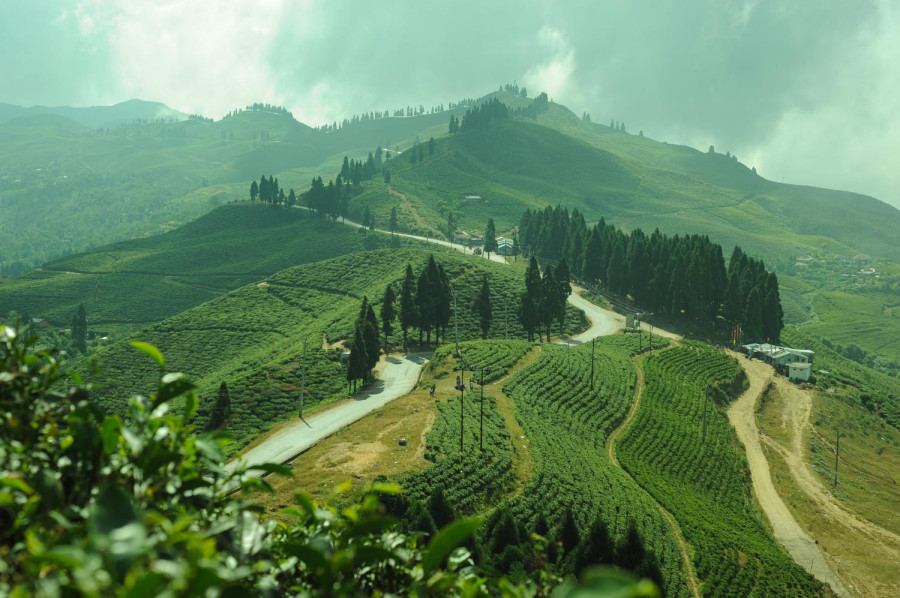Money
India dominates Nepal’s orthodox tea export market
The central bank’s report on the Nepali orthodox tea industry suggests market diversification for better price gains.
Krishana Prasain
Nepal exports more than 88 percent of its orthodox tea to India, leaving only a small fraction for third-country markets.
A recent report highlights the need for market diversification to countries like Japan, China, and Russia, suggesting that expanding exports beyond India could help Nepali orthodox tea producers achieve better price gains and reduce market dependency.
Nepal processes 7,838 tonnes orthodox tea annually. The export of orthodox tea to third countries stands at 11.4 percent. Orthodox tea uses traditional methods, including plucking, withering, rolling, oxidation, and drying.
There are two types of exports: organic certified and uncertified. The export of organic certified orthodox tea to third countries is 21.63 percent.
A report by Nepal Rastra Bank highlights that Nepali organic orthodox tea has significant potential in Japan, China, the Netherlands, Canada, Russia, Poland, Turkey, and South Korea.
Despite its potential, Nepali organic tea faces multiple challenges, including difficulties in marketisation, fair pricing, credit facilities, and a lack of skilled workers.
Other obstacles include the lack of technical assistance, insurance, and incentives for organic production. These challenges hinder orthodox tea entrepreneurs from unlocking new potential markets.
According to a special report titled ‘Contribution made by orthodox tea produced in Koshi province in national economy and its potential and challenges’, published by Nepal Rastra Bank’s Biratnagar office, several factories export organic orthodox tea worldwide.
Seven factories export to Japan, four to China, two to the United States, and eight to other countries. The study included 84 orthodox tea factories and 42 orthodox tea growers.
In September 2020, Nepal's orthodox tea received its own trademark, 157 years after the country began growing it. The trademark includes the words 'Nepal Tea Quality from the Himalayas’.
Koshi province has 100 orthodox tea processing factories, with 21 being organic certified.
The cost of production for organic certified orthodox tea is Rs45.16 per kg, whereas for uncertified organic orthodox tea, it is Rs24.72 per kg.
The average income for organic certified orthodox tea farmers is Rs75.52 per ropani, while for uncertified organic orthodox tea farmers, it is Rs48.44 per ropani. Farmers earn a profit of Rs30 per kg for organic certified orthodox tea and Rs24 per kg for uncertified tea.
The recognition and quality that organic certified farmers receive due to certification help them fetch higher prices in the green leaf market, the report said.
Organic certified orthodox tea is cultivated on 27,788 ropanis of land.
During the fiscal year 2022-23, 128 tonnes of organic certified orthodox tea worth Rs120.86 million were sold in the domestic market, 523 tonnes worth Rs306.16 million were exported to India, and 179 tonnes worth Rs257.65 million were exported to third countries.
Organic certified orthodox tea is exported to France, Germany, the US, and Denmark.
Gobinda Dahal, founder chairman of the Central Tea Cooperative Association in Ilam, expressed concerns about the high cost of obtaining organic certification.
He stated that it costs between Rs500,000 and Rs1 million to get organic certification for a hectare of tea gardens, which is too costly for farmers and tea entrepreneurs. He also pointed out that farmers pay 27 percent in various taxes, including VAT, income, and service taxes.
Additionally, he noted the high cost of sending samples to buyers via air cargo due to the lack of a testing lab in Nepal.
The report states that orthodox tea factories have invested Rs3.68 billion, with 36.4 percent of the investment coming from bank loans. The remaining 63.6 percent is self-invested by factories. Only two factories have foreign direct investment.
The average purchase price and production cost of green leaf tea is Rs54.93 per kg. Orthodox tea leaves are purchased from individual farmers, farmers’ groups, and cooperatives.
For organic certified orthodox tea leaves, the average purchase price and production cost is Rs87 per kg.
The cost of production for organic certified orthodox tea is Rs695.62 per kg, yielding a profit of Rs151.87 per kg. The cost of production for organic uncertified orthodox tea is Rs336.74 per kg, with a profit of Rs64.55 per kg.
This shows that the cost of organic certified tea production is double that of organic uncertified tea. However, the profit from organic certified tea is higher by 135 percent.
The domestic price of processed organic certified orthodox tea is Rs941.60 per kg. The international market price is Rs801.51 per kg. Nepal earns Rs2.57 billion annually from the export of processed orthodox tea.
The report indicates that the average capacity utilisation of orthodox tea factories in Koshi province is 56.21 percent. The main reasons for underutilisation include a lack of raw materials, irregular electricity supply, a shortage of technical and skilled manpower, and a decline in demand.
Despite these challenges, the report highlights the immense potential for Nepal’s orthodox tea in international markets, urging policy reforms and support for tea entrepreneurs.




 10.12°C Kathmandu
10.12°C Kathmandu














